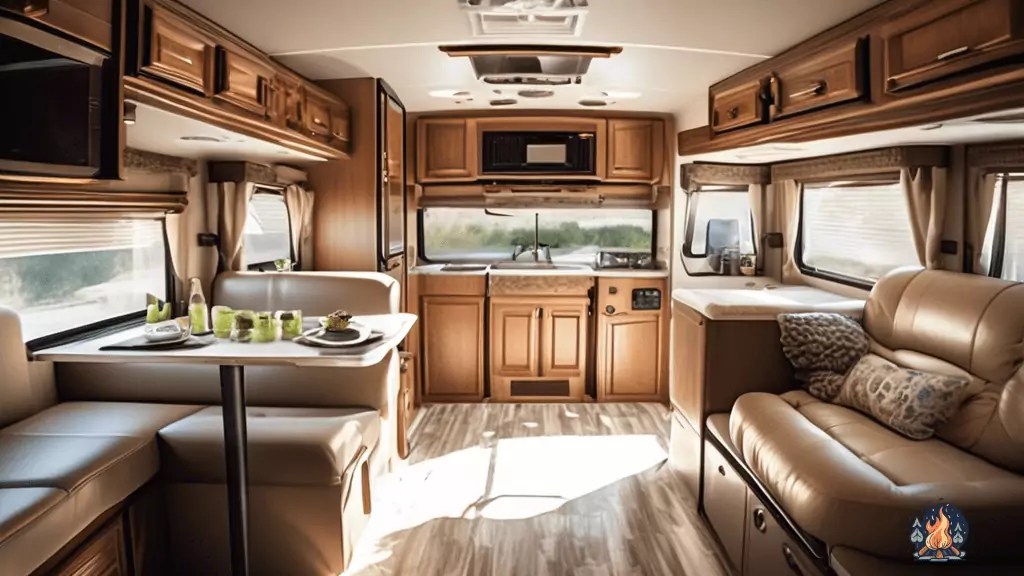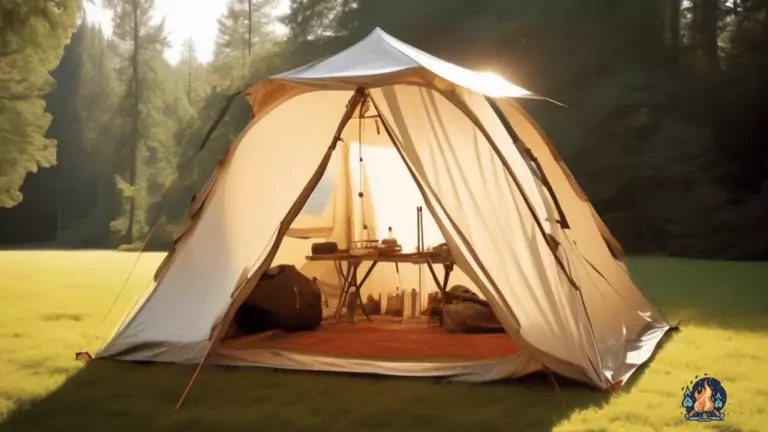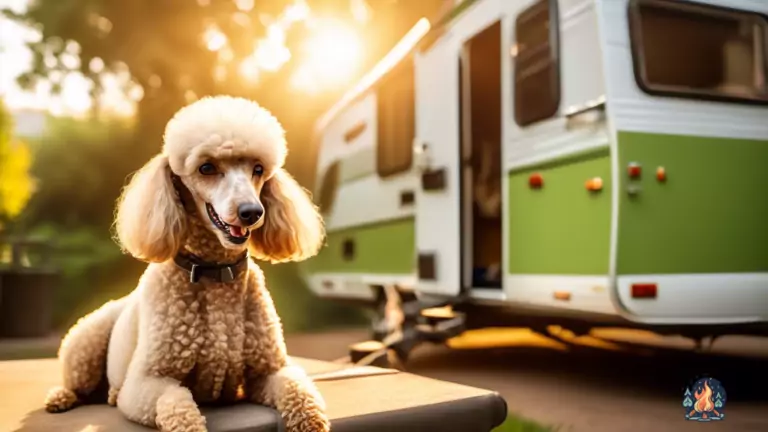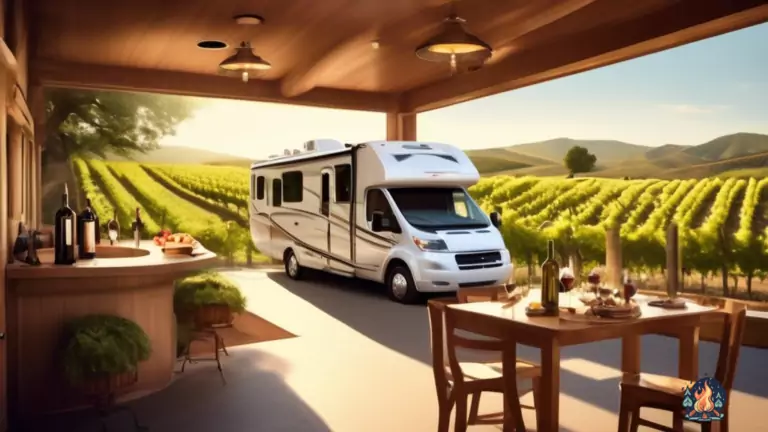Common Issues With RV Propane Systems And How To Troubleshoot
by Kevin Fairbanks • Updated: January 21, 2024
Learn how to troubleshoot common issues with RV propane systems like a pro and ensure a smooth adventure. Don’t let propane problems hold you back – click now for expert tips!

Are you ready to hit the open road in your trusty RV? Before you embark on your next adventure, it’s important to ensure that your propane system is in tip-top shape. After all, your propane system is responsible for providing heat, hot water, and even powering your stovetop for those delicious campfire meals.
But fear not, fellow traveler! In this article, we will explore some of the common issues that can arise with RV propane systems and equip you with the knowledge and troubleshooting tips you need to keep your propane system running smoothly.
Picture this: you’re in the middle of nowhere, enjoying the peace and tranquility of nature, when suddenly you detect a faint scent of propane. Uh-oh! Don’t panic just yet! This article will guide you through the process of identifying leaks in your propane system and provide you with step-by-step instructions on how to troubleshoot and fix them.
We’ll also delve into ignition and burner issues, because let’s face it, no one wants a malfunctioning stove when you’re trying to whip up a gourmet meal on the road. So, grab your sense of adventure and let’s dive into the world of RV propane systems and the art of troubleshooting!
Key Takeaways
- Ensure the propane system in your RV is in good condition before traveling to avoid potential issues.
- Propane leaks can be identified and fixed by conducting a thorough inspection and using soapy water to check for bubbles.
- Troubleshooting ignition and burner issues may involve checking the propane supply, cleaning the burner, and replacing faulty components.
- Low propane pressure can be caused by a variety of factors, such as a faulty regulator, clogged lines, or a low propane tank. These issues can be addressed by checking and replacing the necessary components.
Identifying Leaks in the Propane System
If you smell gas or suspect a leak in your RV propane system, it’s important to act quickly and follow the adage "better safe than sorry."
Propane leaks can be dangerous and should be taken seriously. The first step in identifying a leak is to turn off all propane appliances and pilot lights. This will help prevent any potential sparks or flames that could ignite the gas.
Next, you’ll want to carefully inspect all propane connections and hoses for any signs of wear, damage, or loose fittings. If you see any bubbles forming when you spray a soapy water solution onto the connections, this could indicate a leak.
Another way to check for leaks is by using a propane leak detector, which can be purchased at most RV supply stores. These detectors work by sensing the presence of propane gas in the air. Simply hold the detector near the propane connections and hoses, and if it beeps or flashes, there may be a leak.
Additionally, you can use a handheld propane gas sniffer, which is designed to detect the odor of propane gas. However, keep in mind that these devices are not foolproof and should only be used as a secondary method of detection.
Remember, safety should always be your top priority when dealing with propane leaks. If you suspect a leak, it’s best to turn off the propane supply to your RV and seek professional help. Don’t attempt to fix the issue yourself unless you have experience working with propane systems.
It’s always better to be safe than sorry, especially when it comes to something as potentially dangerous as a propane leak.
Troubleshooting Ignition and Burner Issues
To diagnose problems with ignition and burner in your RV propane system, it’s essential to conduct a thorough troubleshooting process.
First, check if there’s gas in the tank. I know, it sounds obvious, but trust me, sometimes the most obvious things escape our attention. So, make sure you have gas in the tank before you start blaming the poor ignition system.
Next, check if the propane valve is open. Again, another obvious one, but hey, we all have those moments where we forget to turn on the valve and then wonder why things aren’t working.
If you’ve ruled out the gas and the valve, it’s time to move on to the ignition system. Check if the igniter is sparking. If it’s not, give it a good cleaning. Sometimes, all it takes is a little dusting to get that spark back into action. If cleaning doesn’t do the trick, it might be time to replace the igniter. Don’t worry, it’s not as scary as it sounds. Just make sure to turn off the gas and follow the manufacturer’s instructions.
Now, let’s talk about burner issues. If your burner is not producing enough heat or is burning unevenly, it could be a sign of clogged or dirty burner ports. Give those ports a good cleaning with a brush or a small wire. And don’t be afraid to get in there, really dig deep into those ports. If cleaning doesn’t solve the problem, there might be an issue with the gas pressure. Check if the regulator is working properly and adjust it if needed. Trust me, you don’t want to mess with low gas pressure when you’re trying to cook up a delicious meal in your RV.
So, take the time to troubleshoot and fix those ignition and burner issues in your propane system. Your meals and your camping adventures will thank you!
Addressing Low Propane Pressure
When experiencing low propane pressure in your RV, one possible solution is to check for a clogged regulator, such as in the case of a buildup of debris or insects.
Now, I know what you’re thinking. Debris and insects? In my propane system? It’s like they think they’re on a vacation too! But trust me, these little critters can cause big problems. They love to make themselves at home in your RV’s propane system, creating a blockage in the regulator and causing your pressure to drop faster than a clumsy toddler dropping their ice cream cone.
So, grab your trusty flashlight and do a little investigating. If you see any unwanted guests or a collection of debris, it’s time to give them the boot and clean out that regulator. Just remember, this isn’t a game of Whack-a-Mole. Be gentle, yet firm.
Now, if you’ve checked the regulator and it’s as clean as your grandma’s dining table, it’s time to move on to the next potential culprit: the propane tank itself. Yep, even your tank can be the troublemaker in this situation. It’s like that one friend who always promises to bring the snacks but conveniently forgets every time.
So, take a peek at your tank and make sure it’s not running on empty. If it is, well, you know what to do. Time to fill ‘er up! But if the tank is full and you’re still experiencing low pressure, it may be time to call in the professionals. Sometimes, those sneaky issues are hiding in the depths of your RV’s propane system, and it takes a trained eye to uncover the mystery.
Don’t worry, though. With a little troubleshooting and maybe a few laughs along the way, you’ll have your propane pressure back up and running in no time.
Dealing with Propane Odor or Smell
When you detect a strong smell of propane in your RV, it’s important to address the issue immediately to ensure the safety of yourself and others on board. Propane is a highly flammable gas, and any leaks or malfunctions in the propane system can pose a serious risk.
Here are some steps to help you deal with the propane odor or smell in your RV:
- Turn off the propane supply: The first thing you should do when you detect a propane odor is to turn off the propane supply. This will help prevent any further leaks or accidents.
- Open windows and doors: Ventilate the RV by opening windows and doors to let fresh air in. This will help dissipate the propane odor and reduce the risk of ignition.
- Check for leaks: Carefully inspect the propane system for any visible leaks. Look for loose connections, damaged hoses, or any signs of propane escaping. If you find a leak, don’t attempt to repair it yourself. It’s best to seek professional help to ensure the issue is resolved safely.
Remember, safety should always be your top priority when dealing with propane issues. If you’re unsure or uncomfortable handling the situation yourself, don’t hesitate to contact a professional for assistance. It’s better to be safe than sorry, and a trained expert can help ensure that your RV propane system is functioning properly.
Stay safe and happy travels!
Preventative Maintenance for a Reliable Propane System
For a reliable propane system, it’s important to regularly maintain it by performing routine checks and inspections, which can help prevent up to 80% of potential issues.
You don’t want to be halfway through your road trip, cooking up some delicious burgers, only to realize that your propane system has decided to take a vacation. Trust me, it’s not a pleasant experience.
So, let’s talk about some preventative maintenance tips that will keep your propane system running smoothly and avoid any unexpected surprises.
First things first, you want to make sure you have a good old-fashioned visual inspection. Take a look at all the propane lines and connections, and make sure there are no cracks, leaks, or any signs of wear and tear. It’s like giving your propane system a little fashion show, but instead of checking out trendy outfits, you’re checking for any potential hazards. And remember, safety is always in style!
Next, give your propane tanks a little love. Check the exterior for any signs of rust or damage, and make sure the valves are in good working condition. It’s like giving your tanks a little spa day, making sure they’re relaxed and ready to provide you with all the propane goodness you need.
By taking these simple steps, you’ll be well on your way to a reliable propane system that won’t leave you in the lurch.
Frequently Asked Questions
How do I properly store and transport propane cylinders in my RV?
To properly store and transport propane cylinders in your RV, always keep them upright and secure. Make sure they are stored in a well-ventilated area away from heat sources and open flames. And remember, no pranks involving flaming marshmallows! Safety first, folks!
Can I use propane appliances while driving in my RV?
Sure, you can use propane appliances while driving in your RV, but it’s important to ensure they are properly secured and the propane system is functioning correctly. Safety first, my friend!
What should I do if I accidentally run out of propane while camping?
If you accidentally run out of propane while camping, don’t panic! First, check if you have a spare tank. If not, channel your inner MacGyver and whip up a makeshift fire pit. Just remember to roast marshmallows, not your RV!
Are there any safety precautions I should take when using propane appliances in my RV?
When using propane appliances in your RV, it’s crucial to prioritize safety. Symbolically, treat propane like a fire-breathing dragon, respecting its power. Always ensure proper ventilation, regularly inspect connections, and have a fire extinguisher on hand.
How often should I have my RV propane system inspected by a professional?
You should have your RV propane system inspected by a professional every year. It’s like giving your RV a check-up, just to make sure everything is running smoothly and you’re not about to have a propane party you didn’t plan for.

Hi, I’m Kevin, a lifelong camping enthusiast and the voice behind Campfire Discoveries. From tent to RV to cabin camping, I’ve explored it all. Join me as we share stories and tips around the campfire, deepening our connection with the great outdoors.
Keep Reading
-
Tent Setup For Beginners: A Step-by-Step Guide
Master the art of tent setup with our beginner-friendly step-by-step guide. Get ready for your next outdoor escapade and start pitching your tent like a pro today!
-
Tips For Traveling With Pets In An RV For Beginners
Looking to travel with your pets in an RV? Check out these beginner-friendly tips for a pet-friendly adventure on the road. Unleash fun and create lasting memories with your furry friends. Click now for the ultimate guide!
-
Wine Lover’s Paradise: RV Camping Near Wineries
Looking for the perfect getaway? Experience RV camping near wineries and indulge in tastings, breathtaking views, and unforgettable adventures. Plan your wine lover’s paradise today!



